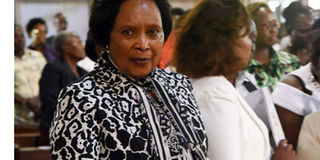Recycling leaders evidence that our democracy is retrogressing

Former Othaya MP Mary Wambui. Her appointment as chairperson of the National Employment Authority has caused a furore. PHOTO | FILE | NATION MEDIA GROUP
What you need to know:
- The purpose of having independent authorities such as the Judiciary and Parliament is to create checks and balances that are crucial in preserving democracy.
- Appointments made outside the law reek of dictatorial systems running counter to the democratic values embedded in our Constitution.
The furore that followed Mary Wambui’s appointment as chairperson of the National Employment Authority is understandable.
Appointment of election losers to state organisations has spiked in the past few years.
But it is not just that which has raised eyebrows, but also the age of the appointees and the way in which they are appointed.
Calls to give youth an opportunity to serve have gone unheeded. Experience, one of the justifications for the controversial appointments, is a fair argument in the scheme of things, but if they fail the transparency and accountability test, they are bound to cause hue and cry.
The vetting initiated under the Constitution allows for public participation and, most importantly, to make appointments fair and open.
In instances where breaches of the law occur, the civil society and individuals have moved to court to challenge appointments that were deemed unlawful.
SEPARATION OF POWERS
However, despite court orders, controversial appointees were allowed to stay on. A recent case is the disquiet around the appointment of members of the National Land Commission.
The quorum was still maintained despite questions about some of the appointees and involvement of the Judiciary to sanction them.
By allowing the questionable appointment of the NLC members, the appointing authority has shown its disregard for the rule of separation of powers.
Without respect for such a rule, we have no democracy to speak of. The purpose of having independent authorities such as the Judiciary and Parliament is to create checks and balances that are crucial in preserving democracy.
To understand the laissez faire attitude towards appointment of recycled leaders, we should first analyse the status of our politics by looking backwards so as to look forward.
BROKEN SYSTEM
The 2010 Constitution was borne of decades of one-party rule, where power was centralised in a stifling way and what the party said went without challenge.
As a result, individuals were hired and fired in the same breath because there were no mechanisms in place to question the leadership.
Hence, the 1pm news kept senior public servants on the edge of the seat waiting to ascertain their return to work the following day.
Security of tenure was not guaranteed; it was a mirage. The dictatorial ways in which appointments were made and ‘unmade’ affected all other facets of our national life.
Parliament, Judiciary and the Executive were joined at the hip and sang from the same hymn book. Accountability could not exist in a dictatorial synergy where views and decisions were tunnelled.
The 2010 Constitution aimed to create clear lines between the three arms of government to enhance democracy, transparency and accountability. Primarily, it was also to create a multiparty democracy.
OPPOSITION
The country has been privileged to subsequently hold a semblance of democratic elections since 1992 despite claims of rigging and election violence.
Multiparty democracy would not have been realised without the participation of a powerful opposition.
Kenya has had input from Narc and ODM, who did well in holding the government to account so far.
To hear the once-opposing ODM now give acquiescence to whatever the government wishes to do, including recycling political losers, is not good for our democracy.
The silence from the Opposition on the fury raging around the legality of appointment of chief administrative secretaries (CAS) also speaks volumes.
One can’t fail to see the benefits of the ‘handshake’ to opposition parties, given the number of their members appointed to such roles.
The handshake has meant that the ruling Jubilee Party and the Opposition ODM have jelled.
DICTATORSHIP
It was not surprising, therefore, for Kenyans to question the role Raila Odinga plays in the government when he issued an order reserved for the Executive following the recent Likoni ferry accident.
I’m concerned, perhaps like many other Kenyans, that the handshake has muted the Opposition, which is very crucial in preserving our democratic state.
African countries have always viewed opposition parties as a nuisance and unnecessary inconvenience, but it is never the case.
The agitation by the younger generation in African countries to join political sphere shows the time is right to let them take charge.
We have seen the transformation the youthful Prime Minister, Dr Abiy Ahmed, has brought to a once-dictatorial Ethiopia. His Nobel Peace Prize is deserved.
The frustration of Kenyans to ‘recycled leaders’ is not borne of dislike of the old, but of the concerns over waning democratic space.
Appointments made outside the law reek of dictatorial systems running counter to the democratic values embedded in our Constitution.
Ms Guyo is a legal researcher. [email protected] @kdiguyo





